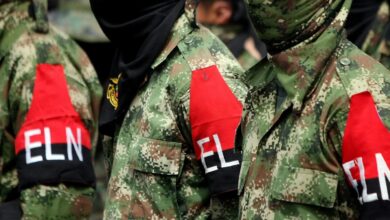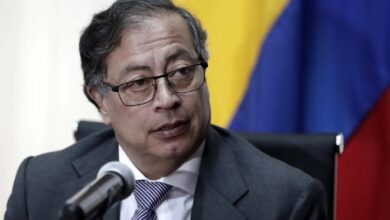Colombia’s ELN Rebels Vow to End Kidnappings Amid Peace Talks
In a significant move, Colombia's ELN rebels agree to cease kidnappings if the current government cease-fire is prolonged.

12/17/2023.- Pablo Beltrán (r), head of the National Liberation Army (ELN) delegation to the peace talks between the Colombian government and the National Liberation Army-ELN, speaks at the closing of the fifth cycle of the peace talks between the Colombian government and the ELN in Mexico City. EFE/ Isaac Esquivel
The Latin American Post Staff
Escucha este artículo
Leer en español: Rebeldes del ELN de Colombia prometen poner fin a los secuestros en medio de conversaciones de paz
ELN's Peaceful Turn: A Landmark Decision
The National Liberation Army (ELN), Colombia's leftist rebel group, has taken a pivotal step towards peace by agreeing to abandon kidnapping as a method of fundraising. This commitment emerged from a weekend of negotiations with the Colombian government in Mexico City, marking a potential turning point in the country's long-standing conflict.
Kidnappings have been a source of deep frustration and anger among Colombians, particularly highlighted by the October abduction of the father of soccer star Luis Díaz, a high-profile incident that brought the issue into the international spotlight. Díaz's father was held captive for 12 days, while his mother was rescued within hours by police. The incident underscored the pervasive fear and unrest caused by such guerrilla tactics.
A Conditional Promise
The ELN's promise came with a condition: the extension of the current cease-fire, set to expire on January 29. This cease-fire has been a fragile but critical element of the peace process initiated in August. However, uncertainties linger over the fate of approximately 38 Colombians currently held by the ELN and the group's commitment to the pledge if the cease-fire ends.
Though cautiously optimistic, this development in the peace talks signals a potential shift in the ELN's approach. Founded in 1964, the ELN is one of the last remaining guerrilla groups in Colombia yet to lay down arms fully. Their engagement in kidnappings has long been a significant concern, often targeting civilians to finance their operations through ransom demands.
Progress Amidst Challenges
The recent negotiation rounds have breathed new life into the often-stalled peace talks. Despite the challenges, Vera Grabe, the government's chief negotiator, acknowledged the progress made towards peace with the ELN. The talks' success hinges on addressing various issues, including the rebels' alleged involvement in illicit trades like cocaine smuggling, a claim the ELN vehemently denies.
President Gustavo Petro, leading Colombia's first left-wing government, has emphasized the importance of these talks in extending the cease-fire. A crucial aspect of the discussions involves tackling the rebels' dependence on illicit activities. This issue, described as "replacing illicit trade," is a potential hurdle in the ongoing negotiations.
The ELN's pledge to cease kidnapping is more than just a tactical retreat; it is a response to the changing dynamics in Colombia and the growing clamor for peace. The government's willingness to engage with the rebel group and the ELN's apparent readiness to alter its strategies offer a glimmer of hope for a lasting resolution to the decades-long conflict.
The Road to Peace
However, the road to peace is fraught with challenges. The talks must navigate the complexities of demobilizing a rebel group entrenched in decades of conflict and criminal activities. Trust-building measures, such as the cessation of kidnapping, are crucial steps in this process, but they require verification and commitment from both parties.
The situation also reflects the broader struggle of post-conflict societies to reconcile, rehabilitate, and reintegrate former combatants. Colombia's journey towards peace with the ELN is about ending hostilities and addressing the underlying socio-economic and political issues that fuel such conflicts.
Also read: Darien Jungle Becomes Global Migrant Highway Between Colombia and Panama
Furthermore, the international community's role must be recognized. Support from countries like Mexico, which facilitated the recent talks, and organizations like the United Nations is crucial in providing the necessary framework and legitimacy for the peace process.
The ELN's decision to stop using kidnapping as a fundraising tactic is a significant step towards peace in Colombia. While the path ahead is complex and uncertain, this development offers hope for a country weary of conflict. The success of these talks will depend on the commitment of both the government and the ELN to address the conflict's root causes and work towards a sustainable and inclusive peace. As Colombia treads this path, the support and vigilance of the international community will be essential in ensuring that this opportunity for peace does not slip away.




